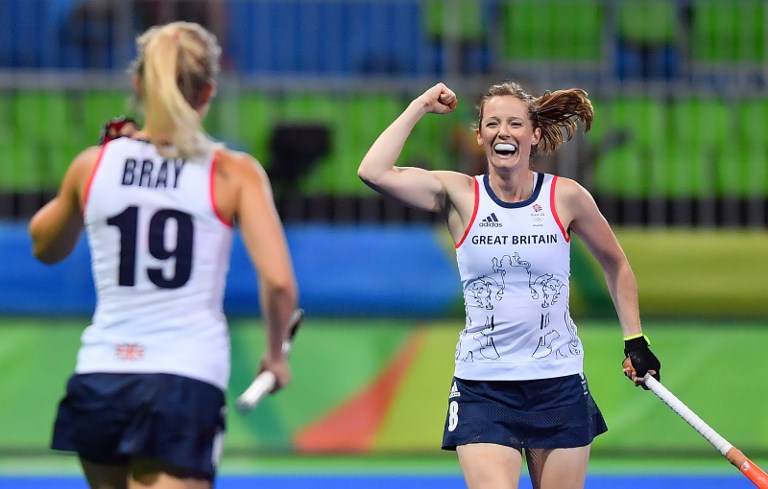
by Pirate Irwin
© Agence France-Presse
LONDON, United Kingdom (AFP) — British hockey star Helen Richardson-Walsh — who battled back from depression to win an Olympic gold medal in Rio — says young athletes need help to manage the pressures that come with top-level sport.
Richardson-Walsh, 36, said young, ambitious elite sportsmen and women may be unaware of the incessant and challenging demands they will face.
“Transition into sport is equally if not more important than making transition out,” she told a panel in London discussing athletes and their mental health.
“Young people coming now into professional sports is difficult. You go from being someone enjoying sport and doing it because you love it to suddenly being in this environment with the pressure and expectations.”
Richardson-Walsh, who became the youngest woman to represent Britain in hockey at an Olympics at the age of 18, says it is almost impossible to switch off.
“When I woke up in the morning I had to put a heart monitor on my finger before I had breakfast,” she said.
“It told me how many hours I had slept. For breakfast the question was ‘what am I going to eat?’ not ‘what do I want to eat?’.
“The young may want so much to think about being an athlete but it is 24/7, you don’t go to get home at five, job done. You have to think about everything you have to do. Transitioning into that is a big thing.”
Richardson-Walsh, who has competed at four Olympics, has struggled with bouts of depression and wrote a blog documenting her struggles in 2014.
‘Tools’
The hockey player, who was helped by her wife Kate, also a team-mate, says she has even questioned part of the legacy of the Olympic success.
“After Rio and London I visited schools and lots of young girls who suddenly wanted to be a hockey player,” she said.
“Initially I thought for them that is great as it is a pathway to a potential career opportunity but then on the other side I thought ‘ah, actually is that a good thing?’. How early do you decide you want to do that?”
Shameema Yousuf, who works as a psychologist for young players at Premier League side Brighton, says it is important to reach aspiring elite athletes as early as possible.
“I think that is key if we give youth the tools and build their awareness up at that age,” said Yousuf, referring to the 10-16 age group at the club.
“Then they are better able to identify and manage themselves at an older age in an environment where stresses will be different at competition level.
“However, they will have that self-awareness of ‘I am actually going through something and need to go and speak to someone’.”
Richard Bryan, rugby director for the Rugby Players’ Association, with responsibility for welfare services and programmes, says he has observed an interesting change in players coming forward to admit they are battling with mental health issues.
“There is a possible start of a trend among the players who are accessing our confidential hotline,” he said.
“The largest age group last year was 18-25 whereas a couple of years previously it was the over-30s.
“It will be interesting to see if that continues for it suggests those that are coming into the professional system, perhaps work is being done through schools or it is a generational difference and people are more open to talking about issues they are facing.”
© Agence France-Presse







